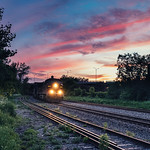
A row of black men clad in black uniforms is down on one knee, their arms interlocked along the sideline of what is obviously a football field. Their heads are bowed, while behind them stands a row of racially varied men in casual, mostly identical civilian clothes, their arms also hooked together as they stare into the near distance.
It commands a kind of tender patriotism that asks: What is it to love one’s country, and, for that matter, to love anything?
Music from deep mournful cellos begins to play as the scene comes to life, though the figures and subsequent scenery from around the stadium are animated, and in a rich palette of colors.
It is impossible not to notice that no words are ever spoken, either from the figures on screen or any narrator. It is left to the cellos to carry the entire audio load.
But the pacing and texture of the sounds are just different enough from the original song being rep...
Read More










Recent Comments